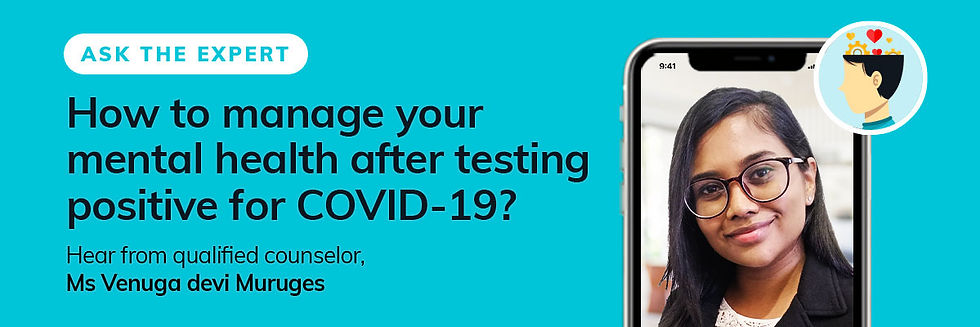Ask the Expert: Managing your mental health when you test positive for Covid-19
- Doctor Anywhere
- Feb 16, 2022
- 2 min read
Updated: May 16, 2023

Finding out that you have tested positive for Covid-19 can be a worrying and stressful experience. Adding to that, having to be isolated under quarantine is a challenging task by itself.
“At the point of diagnosis, it is normal for you to be concerned about your health.
However, it is important to remember that being in a poor state of mental health can affect your physical health as well,” shared Ms Venugadevi, a licensed mental health counsellor at Doctor Anywhere.
We speak to Ms Venuga on how you can manage your mental wellbeing while serving your quarantine.

Remember that you are not alone.
“At times having a strong support network is key. The Covid-19 pandemic is a global crisis affecting everyone, you are not alone. Be it the feeling of loneliness, concern for your health, or the safety of your loved ones, the first healthy step to take would be to communicate these concerns to a close circle of friends and family,” said Ms Venuga.
While you are in quarantine, block out some time each day to chat with someone on the phone. This can give the day some structure and help tackle feelings of loneliness.
Use this time for self-care.
Self-care habits like meditation are often neglected in our busy lives. Your quarantine period is the perfect time to nurture these habits, which can help you to be in touch with your emotions and regulate your mental wellbeing.
“Try activities such as stretching exercises, meditation, yoga, reading, reorganising your space, watching mood- lifting content, and engaging in creative work like music and art. They can help you to manage stress and anxiety during your quarantine period,” advised Ms Venuga.
Minimise time spent consuming Covid-related news.
Being in quarantine at home, it might be tempting to spend a lot of time scrolling through social media and reading the news. This may lead to more anxiety, so focus on positive content instead. Limit your news and social media consumption only to specific times of the day, once or twice a day if needed.
Seek emotional support and assurance from mental health professionals.
“If you are experiencing anxiety, stress, grief, or panic attacks, it is essential that you do not brush them aside or minimise their impact. Seeking the right support and care is vital to helping you stay mentally and emotionally positive throughout your quarantine period. And sometimes, that help you need may come in the form of a professional counsellor or psychologist,” explained Ms Venuga.



Comments